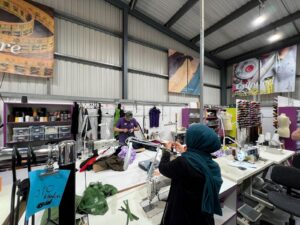Moving to a circular economy
The UK could become an international leader in developing the circular economy model, following the publication of draft guidance by the British Standards Institution (BSI).
The draft BS 8001 framework for implementing the principles of the circular economy in organisations is thought to be the first of its kind in the world and is the culmination of two years‘ work by the BSI and a panel of sustainability experts.
It aims to help companies get a better understanding of what it means to a more circular and sustainable form of production.
And while the draft document states the new standard is not intended to be prescriptive, it does provide a suggested framework which organisations can use or adapt as they see fit.
The guiding principles of the new standard are based around systems thinking, innovation, stewardship, collaboration, value optimisation and transparency.
In particular, the draft document encourages organisations to take a more holistic approach and create extra value by using resources more sustainability, with less waste.
Sutton Council’s sustainability manager, Andrea Crump, said the new BSI draft framework will bring more clarity to the circular economy concept.
‘It’s making sure we maximise the value of things and go beyond just making sure we use resources more efficiently to getting rid of the concept of waste altogether,‘ said Ms Crump. ‘So nothing is wasted.‘
‘One of things about the circular economy is saying how do we manage things for a positive good? It’s a much nicer message to get across.‘
The concept of a circular economy dates back to the 1960s, back has recently been updated by a number of organisations, including the Ellen MacArthur Foundation.
It was first developed as a reaction against the ‘linear’ business model of ‘take, make and dispose’ and encourages firms to change the way they operate, and pursue sustainable economic growth by managing resources more effectively, and eliminating waste.
The London borough of Sutton held a conference entitled Energising the Sustainable Economy in Cities in October, which had more than 100 attendees from across Europe.
‘We brought experts from across Europe and the UK to talk about how cities are energising this sector and how they can benefit from it,‘ said Ms Crump.
‘It did a good job at highlighting what is out there. It looked both at the circular economy, and what needs to underline the circular economy, including sustainable energy.
‘All of the elements of a truly sustainable economy need to be renewable. If you don’t have renewable energy in that mix, then it’s not going to be a circular economy.‘
Leading by example
Ms Crump said as the ideas around a circular economy take shape, there needs to be a shift from focussing on recycling some items to looking at how, or even if, products can be repaired and made to last longer.
‘You need to think about the next stage of that item. How easy is it to take apart? Can the components be taken apart? And before that you have to ask do you need those products in the first place,‘ she added.
‘The big organisations are already looking at this and way ahead of the curve. People like Unilever and B&Q are making amazing progress. The public sector needs to lead by example. Public estates are massive, so there’s a lot of buying power there and the potential for us to do good.
‘Apart from our own procurement, I think we have a role to facilitate the circular economy across our boroughs as well. We need to be helping businesses identify the opportunities and bring people together. There is some amazing work going on at the moment.‘
The draft BSI framework highlights the business benefits of moving to a circular economy, as well as the obvious social benefits.
It encourages organisations to look at this as a means of generating cost savings, new sources of revenue and improved customer relationships.
And most importantly, the draft also includes an eight-stage framework to help put the principles behind the circular economy into practice.
The draft guidance has been published as the UK waste and recycling organisation WRAP has been shortlisted for an international award for its work towards delivering a circular economy.
The not-for-profit group has been shortlisted in the government, cities and regions category at the Circulars Awards.
The BSI has also launched a new standard on step-wise implementation of an environmental management system, BS 8555.
The standard includes a five-step approach to creating an environmental management system that can help decrease waste, save energy and enhance management system processes.
According to the BSI, BS 8555 is aimed at organisations that want to improve their environmental performance, for financial or corporate responsibility reasons, but are unsure how to begin the process.
The first draft of BS 8001 is available for public consultation until 15 January, 2017 at http://drafts.bsigroup.com.
The publication of the final standard for the circular economy is due to be published by BSI next summer.
Photo by zeronautbe 















